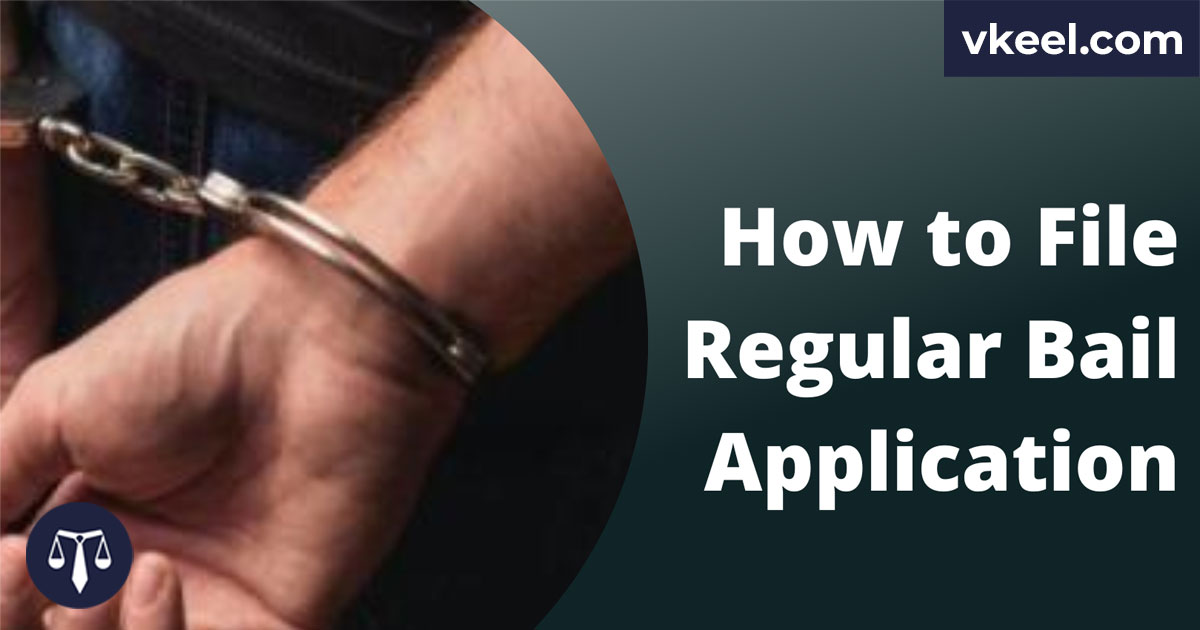How to file a Regular Bail Application?
By Vkeel Team
Table of Contents
- Introduction
- What is a Regular Bail Application?
- How to Prepare a Regular Bail Application?
- What Documents are Required to File a Regular Bail Application?
- Process of Filing a Regular Bail Application
- What to Expect After Filing a Regular Bail Application?
- How to Appeal a Denied Regular Bail Application?
- What are the Benefits of Filing a Regular Bail Application?
- What are the Potential Risks of Filing a Regular Bail Application?
- What are the Legal Requirements for Filing a Regular Bail Application?
- How to Find a Lawyer to Help with a Regular Bail Application?
- Conclusion
Introduction
Filing a regular bail application is a process that can be done by an individual or a lawyer on behalf of the accused. It is a legal process that is used to request the release of an accused person from jail before their trial. This process is used to ensure that the accused person is able to attend their trial and is not held in jail for an extended period of time. This article will provide an overview of the process of filing a regular bail application, including the necessary documents and information that must be provided.
What is a Regular Bail Application?
A regular bail application is a legal process in which an individual who has been arrested and charged with a crime can apply for release from custody prior to their trial. The individual must demonstrate to the court that they are not a flight risk and that they will appear for their trial. The court will consider factors such as the seriousness of the crime, the individual’s criminal history, and the strength of the evidence against them.
If the court is satisfied that the individual is not a flight risk, they may grant the application and release the individual on bail. The individual must then adhere to the conditions of their bail, such as appearing for court dates and refraining from criminal activity.
How to Prepare a Regular Bail Application?
A regular bail application is a legal document that is used to request a court to release a defendant from jail before their trial. It is important to prepare a regular bail application carefully and accurately in order to ensure that the court considers the application favorably.
Step 1: Gather the Necessary Information
The first step in preparing a regular bail application is to gather all the necessary information. This includes the defendant’s name, address, date of birth, and any other relevant information. Additionally, the applicant should provide the court with a detailed description of the charges against the defendant, as well as any mitigating circumstances that may be relevant to the case.
Step 2: Draft the Application
Once all the necessary information has been gathered, the applicant should begin drafting the application. The application should include a clear and concise statement of the facts of the case, as well as a detailed explanation of why the defendant should be released on bail. The applicant should also include any evidence that supports their argument, such as character references or financial documents.
Step 3: Submit the Application
Once the application has been drafted, it should be submitted to the court. The applicant should include all the necessary documents, such as the defendant’s criminal record and any other relevant evidence. Additionally, the applicant should include a cover letter that explains why the defendant should be released on bail.
Step 4: Attend the Hearing
Once the application has been submitted, the applicant should attend the hearing. At the hearing, the applicant should present their argument in favor of the defendant’s release. The court will then consider the evidence and make a decision on whether or not to grant bail.
By following these steps, an applicant can ensure that their regular bail application is prepared accurately and thoroughly. This will increase the chances that the court will consider the application favorably and grant the defendant’s release.
What Documents are Required to File a Regular Bail Application?
In order to file a regular bail application, the following documents are required:
1. A copy of the arrest warrant or criminal complaint.
2. A copy of the defendant’s criminal record.
3. A copy of the defendant’s booking sheet.
4. A copy of the defendant’s bail schedule.
5. A copy of the defendant’s bail bond agreement.
6. A copy of the defendant’s financial statement.
7. A copy of the defendant’s driver’s license or other form of identification.
8. A copy of the defendant’s passport, if applicable.
9. Any other document if required.
Process of Filing a Regular Bail Application
Filing a regular bail application is a process that requires careful consideration and preparation. It is important to understand the process in order to ensure that the application is successful.
The first step in filing a regular bail application is to contact a lawyer. A lawyer can provide advice on the best course of action and can help to prepare the necessary paperwork. The lawyer will also be able to provide information on the applicable laws and regulations.
The next step is to prepare the application. This includes gathering all the necessary documents, such as the defendant’s criminal record, any evidence that may be relevant to the case, and any other information that may be relevant. The application should also include a statement of the defendant’s financial situation, as this will be taken into consideration when determining the amount of bail.
Once the application is complete, it must be filed with the court. The court will then review the application and make a decision on whether or not to grant bail. If the court grants bail, the defendant will be released from custody until their trial date.
It is important to remember that filing a regular bail application is a complex process. It is important to seek legal advice and to ensure that all the necessary paperwork is in order. Following the process carefully will help to ensure that the application is successful.
What to Expect After Filing a Regular Bail Application?
After filing a regular bail application, the court will review the application and decide whether to grant bail. If the court grants bail, the defendant will be released from custody until the trial. The court may also set certain conditions for the defendant’s release, such as requiring them to report to a probation officer or to stay away from certain people or places.
The court may also require the defendant to post a bond or other security to ensure that they will appear in court when required. The amount of the bond or security will depend on the severity of the charges and the defendant’s criminal history.
Once the bail is granted, the defendant will be released from custody and will be able to return to their normal life until the trial. However, they must abide by the conditions set by the court and must appear in court when required. Failure to do so could result in the bail being revoked and the defendant being taken back into custody.
How to Appeal a Denied Regular Bail Application?
If your regular bail application has been denied, you may be able to appeal the decision. The process for appealing a denied bail application varies depending on the jurisdiction, so it is important to familiarize yourself with the laws in your area. Generally, the process involves filing a written notice of appeal with the court and providing a copy to the prosecutor.
Once the notice of appeal has been filed, the court will set a hearing date. At the hearing, you will have the opportunity to present evidence and arguments in support of your appeal. You may also be able to call witnesses to testify on your behalf. The court will then consider the evidence and arguments presented and make a decision on whether to grant or deny the appeal.
It is important to note that the court may not grant the appeal if it finds that the original decision was reasonable. Therefore, it is important to prepare a strong case in support of your appeal. This may include gathering evidence, such as character references, to demonstrate that you are not a flight risk or a danger to the community.
If your appeal is successful, the court will grant your regular bail application and you will be released from custody. If the appeal is denied, you may be able to file a motion for reconsideration or a petition for a writ of habeas corpus.
It is important to note that the appeals process can be complex and time-consuming. Therefore, it is advisable to seek the assistance of an experienced attorney who can help you navigate the process and ensure that your rights are protected.
What are the Benefits of Filing a Regular Bail Application?
Filing a regular bail application can provide numerous benefits to those who are facing criminal charges.
Firstly, it can help to reduce the amount of time spent in jail while awaiting trial. This is because the court can review the application and make a decision on whether to grant bail or not.
Secondly, it can help to ensure that the accused is able to attend their court hearings and other important appointments. This is because the court can set conditions for the accused to follow, such as attending court hearings and not leaving the jurisdiction.
Thirdly, it can help to protect the accused’s rights and ensure that they are treated fairly by the court. This is because the court will review the application and consider the accused’s circumstances before making a decision.
Finally, it can help to reduce the stress and anxiety associated with being in jail while awaiting trial. This is because the accused will know that their application is being considered and that they may be released on bail.
Overall, filing a regular bail application can provide numerous benefits to those who are facing criminal charges. It can help to reduce the amount of time spent in jail, ensure that the accused is able to attend their court hearings, protect the accused’s rights, and reduce the stress and anxiety associated with being in jail.
What are the Potential Risks of Filing a Regular Bail Application?
Filing a regular bail application can be a risky endeavor. There are several potential risks associated with this process, including the possibility of a denial of bail, the potential for a high bail amount, and the possibility of a lengthy court process.
First, there is the risk of a denial of bail. If the court finds that the accused poses a risk to the community or is likely to flee, they may deny the bail application. This means that the accused will remain in jail until their trial.
Second, there is the potential for a high bail amount. The court may set a high bail amount if they believe that the accused is a flight risk or poses a danger to the community. This can be a financial burden for the accused and their family.
Third, there is the possibility of a lengthy court process. If the accused is denied bail, they may have to wait in jail for months or even years before their trial. This can be a difficult and stressful experience for the accused and their family.
In conclusion, filing a regular bail application can be a risky endeavor. There is the potential for a denial of bail, a high bail amount, and a lengthy court process. It is important to consider these risks before filing a bail application.
What are the Legal Requirements for Filing a Regular Bail Application?
In order to file a regular bail application, certain legal requirements must be met. Firstly, the applicant must be able to demonstrate that they are not a flight risk and that they will appear in court when required. This can be done by providing evidence of a stable residence, employment, and family ties.
Secondly, the applicant must provide a detailed description of the charges they are facing and the circumstances of their arrest. This should include any evidence that may be relevant to the case, such as witness statements or police reports.
Thirdly, the applicant must provide a financial statement that outlines their current financial situation. This should include information about their income, assets, and liabilities.
Finally, the applicant must provide a written statement that outlines why they believe they should be granted bail. This should include any mitigating factors that may be relevant to the case, such as the applicant’s ties to the community or their lack of a criminal record.
Once all of these requirements have been met, the application can be submitted to the court for consideration. The court will then review the application and make a decision on whether or not to grant bail.
How to Find a Lawyer to Help with a Regular Bail Application?
Finding a lawyer to help with a regular bail application can be a daunting task. However, there are a few steps you can take to ensure you find the right lawyer for your needs.
First, you should research local lawyers who specialize in bail applications. You can do this by searching online for lawyers in your area, or by asking friends and family for recommendations. Once you have a list of potential lawyers, you should contact each one to discuss your case and determine if they are the right fit for you.
When speaking with potential lawyers, you should ask about their experience with bail applications, as well as their fees and payment plans. You should also inquire about their availability and how quickly they can respond to your questions.
Once you have narrowed down your list of potential lawyers, you should schedule a consultation with each one. During the consultation, you should discuss the details of your case and ask any questions you may have. This is also a good time to get a feel for the lawyer’s personality and communication style.
Finally, you should make sure to read any contracts or agreements carefully before signing them. This will ensure that you understand the terms of the agreement and that you are comfortable with the lawyer’s services.
By following these steps, you can find a lawyer to help with a regular bail application. With the right lawyer on your side, you can rest assured that your case will be handled professionally and efficiently.
Conclusion
In conclusion, filing a regular bail application is a straightforward process that requires the completion of a few simple steps. It is important to understand the legal requirements and the process of filing a regular bail application in order to ensure that the application is successful. By following the steps outlined in this article, you can ensure that your regular bail application is filed correctly and that your rights are protected.
Disclaimer:
The information provided in the article is for general informational purposes only, and is not intended to constitute legal advice or to be relied upon as a substitute for legal advice. Furthermore, any information contained in the article is not guaranteed to be current, complete or accurate. If you require legal advice or representation, you should contact an attorney or law firm directly. We are not responsible for any damages resulting from any reliance on the content of this website.







